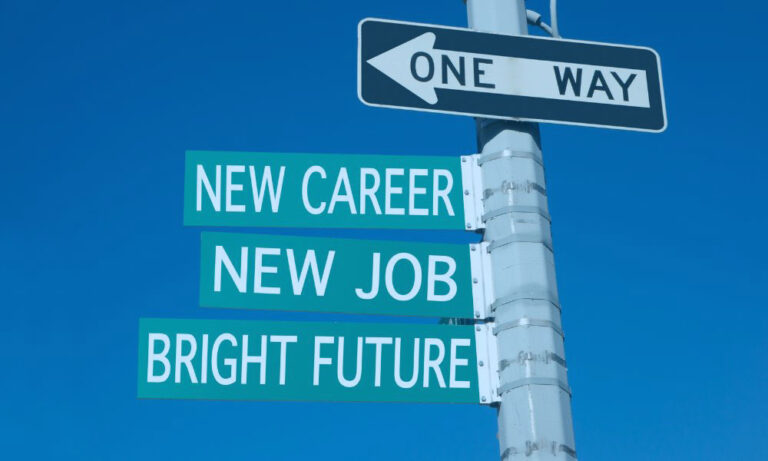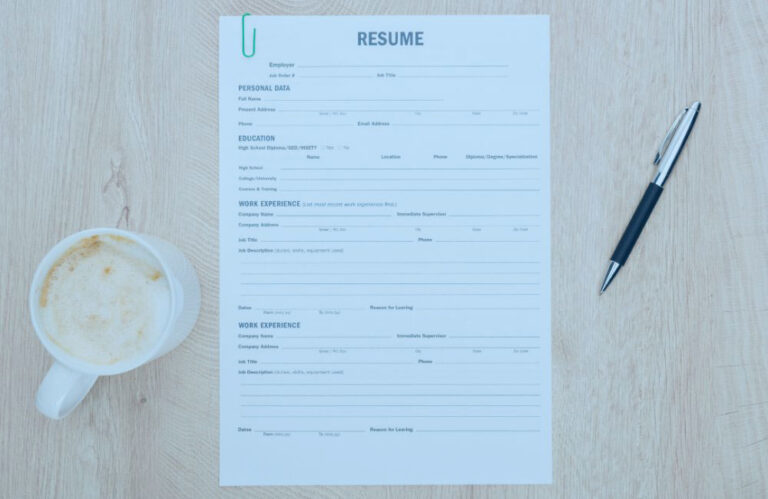How to Explain a Career Change Effectively
A career change[1] is often a pivotal moment in a professional’s life. It involves moving from one industry or profession to another, bringing with it challenges and opportunities. The process[2] of explaining this change to others, especially potential employers or professional contacts, requires tact, preparation, and clarity.
Preparing Your Career Change Explanation
The first step in communicating a career change is preparation. This entails having a deep understanding of why you’re making this change and how it aligns with your long-term goals and aspirations. The key is to communicate this change as a positive development, demonstrating that it’s well-considered and aligns with where you see yourself in the future.
Identify Your Reasons
There are various reasons people switch their careers. It might be because they like something new, want a more stable job, or want to turn their hobby into a job. To figure out why you want to switch, look inside yourself and be honest. Is it because you want a more fulfilling job, trying to escape a toxic work environment, or aiming for a better-paying and stable industry? You should be ready to explain these reasons in a way that shows you’ve thought about it carefully. For insights on common reasons for a career change, refer to Career Change Statistics[3] on The Balance Careers.
Assess the Skills Transferred
One of the main concerns potential employers may have is the applicability of your skills in the new field. Address this by identifying and highlighting transferable skills. These skills can be things like being good at leading teams, communicating well, and solving problems. Develop examples of how these skills were beneficial in your previous role and how they can be applied in your new career.
For example, a manager in a retail sector transitioning to tech might highlight skills in team leadership, customer service, and project management. Creating a matrix can help in comparing job requirements with your skills, showcasing the transferability. For further reading on transferable skills, the University of Southampton[4] offers an extensive guide.
Structuring Your Explanation
After you’ve identified your reasons it comes to crafting a well-structured explanation for your career change, it’s important to do it in a way that makes sense and shows why it’s a good move. This will help people like potential employers, colleagues, or friends feel confident about your choice and believe you can succeed in your new career.
Focus on the Positive Aspects
A key element in your discussion should be a focus on the positive aspects of your career change. Every transition to a new career brings with it a host of potential benefits and opportunities. These might include skill enrichment, a more favorable work-life balance, or an alignment with your personal interests and passions.
When discussing the shift, emphasize the growth, learning, and personal development opportunities that the new career path offers. For example, if you’re making the transition from a corporate job to entrepreneurship, spotlight the potential for innovation, creativity, and contributions to the economy and job market. The U.S. Small Business Administration[7] provides a wealth of resources and data that can be cited to support the positive impact of entrepreneurship.
Discussing your career change, it’s essential to keep things on a positive note. Avoid speaking negatively about your previous job or the industry you’re leaving behind. Instead, talk about what excites you in your new field, the doors it can open, and how your existing skills and experiences align with this transition. You can strengthen your case by citing data from reliable sources like the Bureau of Labor Statistics[5] to support your positive outlook. Back up your optimism with solid evidence, such as industry trends, growth statistics, or opportunities from credible sources like Statista[8].
Relate to Your New Career
Tie your previous experiences and skills to the requirements of your new career. It’s important to make your explanation truly effective and highlight the strong connection between your past experiences and skills and how they fit seamlessly into your new career. Be specific about how your previous background equips you with the tools for success in this fresh venture. Platforms like LinkedIn[6] are valuable for gaining insights into the roles and trends within the industry.
Start by outlining the core skills and experiences from your previous career that are transferable and directly relevant to your new path. Use specific examples to illustrate your accomplishments and insights and how they can be applied in your new setting. For example, if you’re transitioning from a teaching role to corporate training, highlight your skills in curriculum development, instruction, and student engagement, and demonstrate how they seamlessly transfer into employee training and development.
Moreover, take the time to familiarize yourself with the new industry’s terminology, challenges, and opportunities. Platforms like Indeed offer insights[9] into various industries, roles, and the essential skills required. This knowledge will enable you to align your explanation with the specific needs and expectations of your new career.
In essence, explaining a career change is about effective communication, and preparation is the key to making it a success. You should be able to clearly understand and articulate your reasons for the change, emphasize the transferable skills you bring, and convey the transition in a positive and straightforward manner. Always support your points with concrete examples to build trust and confidence in your decision. Remember that every career transition is unique, so it’s crucial to tailor your explanation to reflect your personal journey, considerations, and aspirations.
Addressing Concerns and Questions
When navigating through a career change, it is common to encounter concerns and questions from various quarters, including potential employers, colleagues, and even friends and family. Addressing these questions with clarity, confidence, and evidence is crucial in validating your decision and capabilities in the new role.
Be Ready with Examples
Questions and concerns often revolve around your suitability and adaptability to the new role or industry. Being ready with practical examples that illustrate your relevant skills and achievements is a potent strategy to allay these concerns. These examples serve as tangible proof of your abilities and how they translate into the new career context.
For example, if you used to work in marketing for products like food and drinks and now want to work in the technology industry, you might be asked about your technical skills and knowledge. You should be ready with examples that highlight your successful marketing campaigns that used tech tools or show that you’ve taken the initiative to learn about technology trends and programming languages. Resources like Coursera[10] or edX[11] can be mentioned to showcase your proactive learning efforts.
Each example should be specific, measurable, and relevant. It should clearly explain what your role was, the challenges you faced, and the results you achieved. Make sure these examples match the requirements and expectations of your new career to prove that you’re well-prepared and a good fit for the job.
Show Your Commitment
Another common concern is the sustainability of your career change. Questions might arise about your commitment and longevity in the new role or industry. It is essential to clearly state your commitment, showing that your career change is not a whimsical decision but a well-considered move aligned with your long-term goals.
Discuss your vision for the future in the new career, including your plans for growth, learning, and contributions. Mention any preparatory steps you’ve taken, such as additional courses, certifications, or networking – initiatives that exhibit your earnestness. Websites like LinkedIn Learning[12] where you might have acquired new skills specific to your new career can be highlighted.
Also, address any industry-specific concerns with data and insights. For example, if you’re moving into a field known for its volatility or competitiveness, use data from sources like the Bureau of Labor Statistics[13] to support your understanding of the industry dynamics and your preparedness to navigate them.
In conclusion, when you want to answer an employer’s worries and questions well, it’s about getting ready and explaining things clearly. You need to have real examples that prove your skills and what you’ve done. Also, show you’re serious by talking about what you’ve done and what you plan to do in the future. Each of your answers should show that you’re ready, can adjust to new things, and have a plan for the long term in your new job. This will make others believe you can do well after changing careers.
Emotional Challenges
Transitioning to a new career often comes with a set of emotional challenges. The journey is typically characterized by a mix of excitement, anxiety, and uncertainty. Navigating these emotions effectively is crucial to ensure a smooth transition and to lay a solid foundation for success in the new career.
Handling Uncertainty
One of the most common emotional challenges we face is when we don’t know what’s going to happen. We might worry about whether we’re making the right choices if we’ll do well, or how others will see us in a new job. To handle this feeling, we need to use our minds and practical strategies.
Firstly, acknowledge that feeling uncertain is a natural part of the transition. Engage in self-reflection to understand the root of your uncertainties and address them logically. Setting clear, achievable goals and developing a step-by-step plan to reach them can also mitigate uncertainty.
Educational platforms like Khan Academy[14] offer free resources to upskill, which can make you feel more certain about your abilities. Connecting with professionals in the same field through platforms like LinkedIn can give you real-world insights and lessen your worries about your new career.
Joining community forums or groups related to your new career can also be beneficial. Sites like Meetup[15] can be a great place to connect with like-minded individuals or professionals in your desired field, this can give you advice and support to make you feel more sure about what you’re doing.
Building Confidence
Building confidence in your decisions and abilities is another crucial aspect of addressing emotional challenges. Confidence stems from knowledge, preparation, and self-assurance.
Start by arming yourself with knowledge. Research your new career extensively, understanding the roles, requirements, industry trends, and opportunities. Government labor sites like O*NET Online[16] offer detailed job descriptions, required skills, and industry outlooks that can be instrumental in this phase.
Getting ready is also a big part of being confident. You not only have to learn the stuff you need to know, but you also have to get your mind ready. Think about what you’re good at and the things you’ve achieved before. Then, connect these with your new career. You can tell a story that shows you’re a good fit and you’re ready for it, using examples of your past success.
Being sure of yourself is important too. Talk to people who know about the job or career, like mentors or professionals. Their insights, encouragement, and constructive feedback can be invaluable in building confidence. You can find free mentoring on platforms like Score[17], where experts can help you feel more confident.
In essence, dealing with the emotional challenges of changing your career is all about getting rid of the doubts by learning and getting ready, and feeling confident with the help of feedback and support. When you do these things, and stay positive and realistic, you’re more likely to do well and stay strong in your new career.
Practical Challenges
In addition to emotional hurdles, there are several practical challenges that individuals often encounter during a career transition. These obstacles can range from the need to acquire new skills to building a network in an unfamiliar industry. Effectively addressing these challenges is essential for a successful transition and ensuring that you hit the ground running in your new career.
Acquiring New Skills
The need to acquire new skills is one of the most tangible challenges faced during a career switch. Every industry and job role has a unique set of skills and knowledge bases required to succeed. It becomes essential for transitioning professionals to identify, learn, and master these to prove their competence and value.
A good way to start is by looking at the job ads for the kind of job you want. There are websites like Glassdoor[18]. that can help with this. This helps you figure out exactly what skills and qualifications you need for your new job.
The internet has made it easier to learn new skills. Websites like Coursera and edX have lots of courses in different fields. Some of them are even free. You can learn at your speed. LinkedIn Learning also has courses that are connected to jobs, so you can learn things that will help you in your career.
Furthermore, attending workshops and seminars, obtaining certifications, or even going back to school for an advanced degree in the field can also be viable options. Resources such as the U.S. Department of Education’s database[19] of accredited educational institutions can be invaluable for those considering this route.
Networking in a New Field
Building a professional network in a new industry is another tangible challenge. A robust network can provide support, guidance, job opportunities, and endorsements, all of which are invaluable in a career transition.
Begin by leveraging your existing connections. Reach out to acquaintances, alumni, or colleagues who might have contacts in the new industry. Tools like LinkedIn are essential for this, allowing for easy identification and outreach to potential contacts.
Joining professional associations related to the new field is another effective strategy. These associations often have networking events, seminars, and resources that can be instrumental in building connections. Sites like Meetup can also be used to find networking events or groups related to specific industries or professions.
In addition, informational interviews can be a powerful tool. Reach out to professionals in the new field for informal conversations to gain insights, advice, and connections. Platforms like Wisdom Share[20] can facilitate such interactions.
Volunteering is another avenue to consider. It not only enables you to gain experience and skills but also exposes you to a network of professionals in the field. Websites like VolunteerMatch[21] can help find opportunities aligned with your targeted industry.
In essence, it’s important to focus on learning new skills and making connections. By using all the available resources and aiming for specific goals, you can reduce the difficulties and make it easier to move into a new career successfully.
Success Stories of Career Change
The narratives of individuals who have successfully navigated career changes are both inspirational and instructive. These stories highlight the challenges, strategies, and outcomes of transitioning to a new career, offering insights, and lessons for those contemplating a similar path.
Lessons Learned
Analyzing successful career change stories reveals a common thread of lessons that can be invaluable for aspiring career switchers. Each story underscores the power of preparation, adaptability, and persistence, shedding light on the actionable strategies and mindsets that contribute to a successful transition.
For instance, consider the case of Julia, a professional who transitioned from a career in journalism to become a software developer. Her story, documented on resources like Career Shifters[22], provides practical insights into the dynamics of a successful career change.
Adaptability
Adaptability emerges as a critical trait in successful career change stories. It is the ability to adjust, learn, and evolve in the face of new challenges and environments. This trait is exemplified in the story of individuals like Arlene, who transitioned from being a nurse to a web developer. Her journey, chronicled on platforms like FreeCodeCamp[23], underscores the significance of adaptability.
Adapting involves learning new skills, getting used to different ways of working, and sometimes doing things that feel a bit scary. In a world where industries are always changing and technology is getting better, being adaptable not only helps you switch to new things but is also really useful for your career in the long run. Forbes articles often talk about how being adaptable is super important for being successful in your career.
Persistence
Being persistent is a common factor in successful career changes. When people switch to a new job, they usually face problems, rejections, and new things to learn. It’s important to keep trying and not give up when these challenges come up.
Take the example of Michael, who switched from a career in sales to becoming a data scientist. Documented on platforms like Towards Data Science[24], his story underscores the role of persistence. He faced rejections and had to overcome significant learning curves but remained undeterred.
The role of persistence is also emphasized in academic and institutional publications. For example, the Harvard Business Review offers insights into the importance of resilience and persistence in career changes, backed by studies and expert opinions.
In essence, the successful stories of people who change their careers successfully teach us important things about being able to adjust and not giving up. These stories give us useful advice, ideas, and motivation for those trying to switch to a different job, even if it’s uncertain and difficult. Each story shows that changing your career might be tough, but it can lead to personal growth, happiness, and success in your work life.
Case Studies
Looking at real stories of people changing careers can give us a better understanding of how it’s done. These stories show the difficulties people faced, the things they did to succeed, and what happened in the end when they switched jobs. They can help others who are thinking about changing careers by giving them ideas and motivation.
From Finance to Tech
One compelling case study is of Sarah, a professional who made a successful switch from a career in finance to the tech industry. Significant achievements marked Sarah’s decade-long experience in finance, but a burgeoning interest in technology and innovation prompted her to consider a switch.
Sarah’s transition is documented on platforms like Medium, where she shares insights into her strategic approach to this significant career shift. She began by self-learning coding through resources like Codecademy[25] and Udemy[26], where affordable and flexible learning modules allowed her to build a foundational understanding of tech languages and tools.
Networking played a pivotal role in Sarah’s transition. She connected with tech professionals and joined tech communities on LinkedIn and Twitter[27], gaining insights, support, and opportunities that were crucial in her journey.
Sarah also pursued a certification in Data Science from Harvard’s online learning platform[28], adding formal education to her self-learning endeavors. This blend of education enabled her to secure a role as a Data Analyst in a leading tech firm, marking the successful transition from finance to tech.
From Healthcare to Entrepreneurship
Another insightful narrative is of Alex, a healthcare professional who transitioned into entrepreneurship. With years of experience as a nurse, Alex’s entrepreneurial journey began with an idea to improve patient care through innovative technology.
Alex’s story is highlighted in Entrepreneur[29], where the steps and strategies of this transition are laid out. The first step involved extensive market research, utilizing resources like IBISWorld[30] to understand market trends, opportunities, and challenges.
He enrolled in business and entrepreneurship courses on Coursera to augment his healthcare expertise with business acumen. Alex also leveraged SCORE[31], a resource that provided him with a mentor to guide his entrepreneurial journey.
Networking was crucial. Alex attended entrepreneurial events found on Eventbrite[32], connecting with other entrepreneurs, investors, and mentors who provided insights, support, and resources.
Alex never gave up. He knew a lot about healthcare, and he learned about business too. With his knowledge, he started a health tech company. This company used new technology to make patients’ care better. This change from healthcare to business was a big success for Alex.
These case studies illustrate the multifaceted nature of career transitions. You need to plan, learn, meet new people, and be ready for change. Every change has its problems, but it also has chances to grow, learn, and succeed. These stories are not just for motivation; they give helpful advice for people who thinking about embarking on a journey to a new career path.







